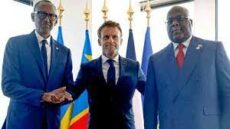Twenty-one African countries abstained or stayed away last week from the UN General Assembly’s vote on a resolution demanding the withdrawal of Russia from Ukraine. Among them, six had a particular, and sobering, relevance for France.
President Emmanuel Macron visited two of them, Cameroon and Guinea Bissau, last July. Another three — Angola, Gabon and Congo — will host him later this week. Macky Sall, the president of the sixth, Senegal, is considered a friend and was a guest at the Élysée Palace just a month ago.
To add insult to injury, Mali, which had abstained at a similar vote last October, switched to vote against the resolution this time, joining Russia and the likes of North Korea and Belarus. Though not fully unexpected, the move was a painful reminder of France’s failures in a country where its armed forces lost 58 men fighting jihadi groups, before being kicked out last year by a military junta to make way for Russian mercenaries from the Wagner Group. Russia’s foreign minister Sergei Lavrov, a frequent traveller to Africa these days, paid a visit to the junta in Bamako in early February in effect to issue his voting instructions.
A chastened Macron is embarking this week on his 18th trip to Africa as president. He has not given up on his ambition to transform France’s decades-old relationship with its former colonies; on the contrary, he sees it as even more necessary in today’s fragmented world. But the French leader has had to rethink his approach. A reset with Africa is badly needed.
These are different times from the early days of his first term when, in November 2017, Macron delivered a passionate speech to a packed auditorium at the university of Ouagadougou, the capital of Burkina Faso. As the first French president born after the colonial era, he declared that the days of France’s old African policy were over. He promised a new model, more balanced and respectful of African identities.
No doubt he would get an even less enthusiastic reception from the students in Ouagadougou today. After Mali, political instability, insecurity, anti-French resentment and Russian disinformation campaigns have spread to Burkina Faso, which has also asked French forces to leave the country. Bruised but reluctant to withdraw completely from the Sahel region as the violence and insecurity now threaten even the coastal states of west Africa, France is redeploying its forces and adjusting its strategy to a more discreet presence. An Éllysée official describes this “new philosophy” as “the end of a cycle where France put itself on the front line. We are moving to a cycle where we will rather work in the background.”
It has been a humbling experience. Macron’s transformative agenda soon collided with the realities on the ground. He wanted France to shed its colonial garb; but fighting terrorism, alongside local governments, implied maintaining military bases which were, in fact, remnants of its colonial past. It is not easy to pretend that you have left when you are still there.
For the sake of stability, the French president ended up contradicting his own professed ideals. He attended the funeral of Chad’s president Idriss Déby in 2021, thereby implicitly endorsing the highly undemocratic transfer of power to Déby’s son. But didn’t France need to keep an air base in N’Djamena to supply its troops in the region?
His support for Ivory Coast’s president Alassane Ouattara, elected in 2020 for a third term which the opposition considered as unconstitutional, was also reminiscent of old French habits. But who wanted to face another crisis in a key country in west Africa?
While France got stuck in its military response to the spreading jihadi assaults, the continent was changing. With the impact of globalisation, countries in Africa viewed the world differently and the world viewed them differently.
France became just another actor among many competing powers. Russia, playing on the close links that the Soviet Union used to maintain with African elites, is back with a vengeance, directly targeting French influence. China and Turkey are big players on the continent, with agendas going well beyond their economic interests. African governments now have a whole array of partners to choose from and will not take advice from their old “protectors”.
So, during Macron’s upcoming trip expect a lot of emphasis on biodiversity, proposals on help in the fight against climate change, offers for agricultural cooperation as well as cultural partnerships. Convinced that Africa and its diaspora in Europe are too important to be left unattended, France is trying again.
Copyright The Financial Times Limited 2023. All rights reserved.

